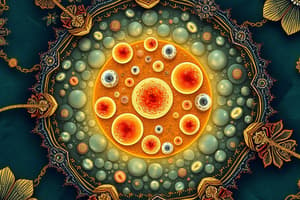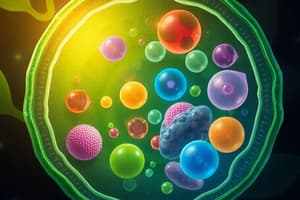Podcast
Questions and Answers
Which technique is primarily used for visualizing the fine details of cellular structures in 3D?
Which technique is primarily used for visualizing the fine details of cellular structures in 3D?
- Centrifugation
- Genetic engineering
- Flow cytometry
- Confocal microscopy (correct)
What is the main focus of stem cell research?
What is the main focus of stem cell research?
- Studying the aging process of cells
- Investigating differentiation potential into various cell types (correct)
- Examining uncontrolled cell growth in cancer
- Understanding cellular responses to environmental stresses
Which cell function involves the ability to sense and react to changes in the environment?
Which cell function involves the ability to sense and react to changes in the environment?
- Response to stimuli (correct)
- Homeostasis
- Communication
- Metabolism
What do genetic engineering techniques like CRISPR-Cas9 primarily allow researchers to do?
What do genetic engineering techniques like CRISPR-Cas9 primarily allow researchers to do?
Which process is essential for maintaining a stable internal environment within a cell?
Which process is essential for maintaining a stable internal environment within a cell?
What is the primary function of ribosomes within the cell?
What is the primary function of ribosomes within the cell?
Which component of the cell is responsible for regulating the passage of substances in and out?
Which component of the cell is responsible for regulating the passage of substances in and out?
Which organelle is known as the 'powerhouse' of the cell?
Which organelle is known as the 'powerhouse' of the cell?
In which type of cells would you expect to find chloroplasts?
In which type of cells would you expect to find chloroplasts?
What is the main role of the endoplasmic reticulum (ER) in the cell?
What is the main role of the endoplasmic reticulum (ER) in the cell?
Which of the following structures provides structural support in plant cells?
Which of the following structures provides structural support in plant cells?
What is the main purpose of microscopy in cell biology?
What is the main purpose of microscopy in cell biology?
How does immunofluorescence microscopy enhance the visualization of proteins within cells?
How does immunofluorescence microscopy enhance the visualization of proteins within cells?
Flashcards
Confocal Microscopy
Confocal Microscopy
A technique used to generate sharp, high-resolution images of samples, providing detailed three-dimensional visualizations.
Centrifugation
Centrifugation
A technique used to isolate different components of a cell based on their density.
Flow Cytometry
Flow Cytometry
A technique used to analyze and sort individual cells based on their physical and chemical properties.
Cell Differentiation
Cell Differentiation
Signup and view all the flashcards
Cellular Senescence
Cellular Senescence
Signup and view all the flashcards
Plasma membrane
Plasma membrane
Signup and view all the flashcards
Cytoplasm
Cytoplasm
Signup and view all the flashcards
Nucleus
Nucleus
Signup and view all the flashcards
Ribosomes
Ribosomes
Signup and view all the flashcards
Endoplasmic reticulum (ER)
Endoplasmic reticulum (ER)
Signup and view all the flashcards
Golgi apparatus
Golgi apparatus
Signup and view all the flashcards
Mitochondria
Mitochondria
Signup and view all the flashcards
Cell wall
Cell wall
Signup and view all the flashcards
Study Notes
Cell Structure
- Cells are the fundamental units of life, with diverse sizes and shapes adapted to their roles.
- Common cell features include:
- Plasma membrane: A selective barrier controlling substance entry and exit.
- Cytoplasm: The fluid interior holding organelles.
- Nucleus (in eukaryotes): Contains the cell's DNA.
- Prokaryotic cells (bacteria, archaea) lack a nucleus and membrane-bound organelles.
- Eukaryotic cells (animals, plants, fungi, protists) have a nucleus and membrane-bound organelles, enabling functional compartmentalization.
- Cell wall (in plants, fungi, some bacteria): Provides structural support and protection; absent in animal cells.
Cellular Organelles
- Ribosomes: For protein synthesis, found in both prokaryotic and eukaryotic cells.
- Endoplasmic reticulum (ER): Involved in protein and lipid synthesis. Rough ER has ribosomes; smooth ER lacks them.
- Golgi apparatus: Modifies, sorts, and packages proteins and lipids.
- Mitochondria: "Powerhouses" of the cell, involved in cellular respiration, generating ATP.
- Lysosomes: Contain digestive enzymes for waste breakdown.
- Vacuoles: Fluid-filled sacs for storage, significant in plant cells for maintaining turgor pressure.
- Chloroplasts (in plant cells): Conduct photosynthesis, converting light energy into sugars.
- Cytoskeleton: A network of protein fibers (microtubules, microfilaments, intermediate filaments), supporting cell shape and movement, anchoring organelles, and facilitating intracellular transport.
Cell Technologies
- Microscopy: Crucial for visualizing cell structures, ranging from light microscopy (basic views) to advanced electron microscopy (detailed views).
- Cell culture techniques: Grow cells outside organisms for research and drug testing.
- Fluorescence microscopy: Uses fluorescent dyes to highlight specific cell structures or molecules, revealing dynamic processes.
- Immunofluorescence microscopy: Targets specific proteins using antibodies labeled with fluorescent dyes.
- Confocal microscopy: Creates high-resolution, detailed 3D images.
- Genetic engineering techniques (PCR, CRISPR-Cas9): Study and modify cell genes.
- Centrifugation: Separates cell components based on density differences.
- Flow cytometry: Measures and sorts cells based on physical and chemical properties.
Cell Functions
- Metabolism: All chemical reactions in the cell, including energy production and consumption.
- Transport: Movement of substances across the plasma membrane.
- Communication: Cells interact through various signaling mechanisms.
- Growth and division: Essential for development, repair, and reproduction.
- Differentiation: Cells become specialized in structure and function.
- Response to stimuli: Cells sense and react to environmental changes.
- Homeostasis: Maintaining a stable internal environment.
Cellular Specialization and Tissues
- Different cell types possess distinct structures and functions.
- Cells form tissues with coordinated functions.
- Organs are composed of various tissues working together.
- Specialized cells (nerve, muscle, blood cells) perform specific roles.
Advanced Cell Studies
- Stem cell research: Studies cells capable of becoming various cell types, promising for tissue repair and therapy.
- Cancer research: Examines uncontrolled cell growth and division.
- Cellular senescence: The process of cellular aging and its impacts on the organism.
- Cellular responses to stress and damage: How cells respond to stressors and repair damage.
Studying That Suits You
Use AI to generate personalized quizzes and flashcards to suit your learning preferences.




